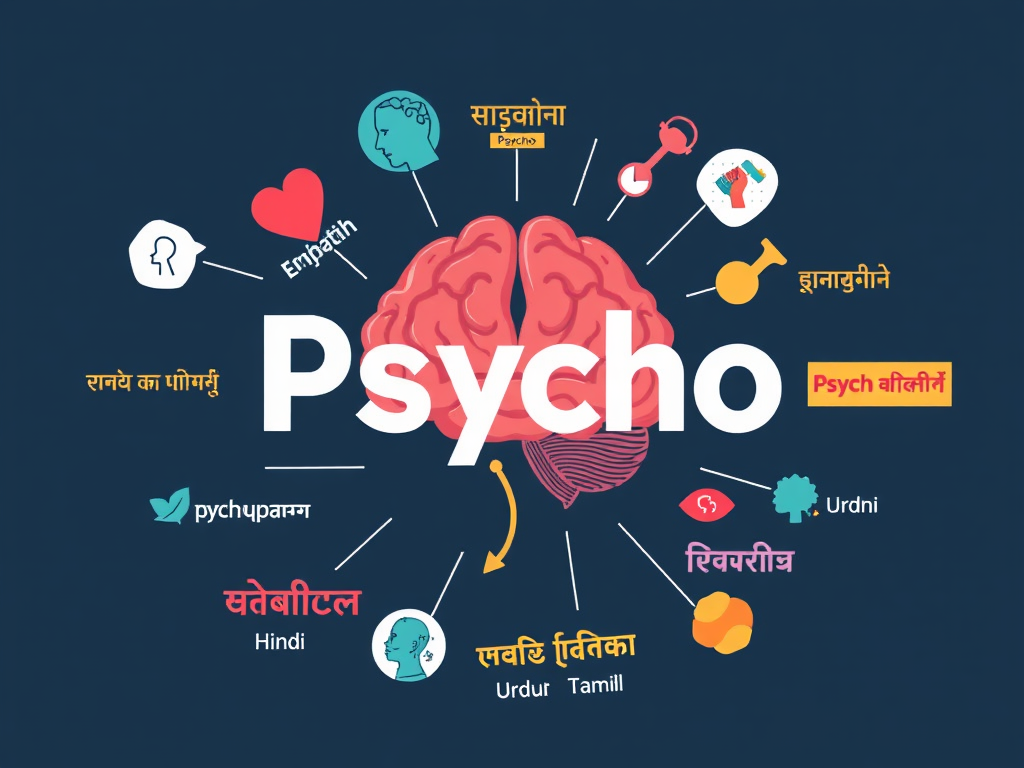The word “psycho” has evolved significantly from its ancient roots to become one of the most complex and sometimes controversial terms in modern language. Understanding the psycho meaning requires exploring its origins, various interpretations, and appropriate usage in different contexts. This comprehensive guide will help you navigate the nuances of this term while promoting respectful dialogue and language sensitivity.
What Does “Psycho” Mean?
Psycho is a term that carries multiple meanings depending on the context in which it’s used. At its core, the word relates to the mind, behavior, and emotional state of individuals. However, its usage has expanded far beyond its original clinical definition.
In contemporary language, psycho can refer to someone exhibiting erratic behavior, unpredictable actions, or emotionally unstable patterns. The term has also become part of casual use in everyday conversation, though this raises important questions about mental health stigma and the impact of language on how we perceive psychological conditions.
The psycho meaning in English encompasses several interpretations:
- A person with severe mental health issues
- Someone displaying anti-social behavior
- An individual showing dissociative behavior
- Casual alternatives for describing intense or extreme behavior
- Slang usage for someone acting unusually or dramatically
Understanding these various meanings is crucial for effective communication and avoiding unintentional harm through language choices.
Meaning of Psycho in English
The English interpretation of psycho has undergone significant language evolution over the decades. Originally derived from psychological and psychiatric terminology, the word has branched into multiple usage patterns.
Primary English meanings include:
| Context | Meaning | Example |
|---|---|---|
| Clinical | Related to psychosis or psychopathy | Medical diagnosis |
| Informal | Crazy or out of control behavior | “That driver is acting psycho” |
| Slang | Wild or intense personality | “She’s psycho about fitness” |
| Derogatory | Insulting someone’s mental health | Often inappropriate usage |
The formal context typically requires more precise diagnostic language, while casual use often employs the term more loosely. This distinction is important for maintaining language sensitivity and avoiding stigma.
Professional settings demand careful consideration of alternative terms that don’t perpetuate negative stereotypes about mental health. The evolution from casual usage to more thoughtful language reflects growing awareness of how words impact empathy and understanding.
Translations of Psycho
Understanding psycho across different languages reveals cultural perspectives on mental health and behavior. Here are key translations:
Psycho meaning in Hindi: साइको (Saiko) – Often used similarly to English, describing erratic behavior or intense personality traits.
Psycho meaning in Urdu: سائیکو (Psycho) – Borrowed from English, commonly used in casual alternatives to describe unpredictable behavior.
Psycho meaning in Tamil: சைக்கோ (Psycho) – Transliterated from English, used in both formal context and slang situations.
These translations show how the term has been adopted globally, often retaining similar connotations about emotional state and behavior patterns. However, cultural contexts influence whether the term carries more stigma or is used more neutrally.
Regional variations in usage:
- South Asian contexts: Often used in film and media to describe villains or emotionally unstable characters
- Western contexts: More clinical awareness but still common in casual use
- Professional contexts: Generally avoided in favor of specific diagnostic language
More Meanings of Psycho
The term psycho extends beyond simple definitions to encompass various behavioral and psychological concepts. Understanding these broader meanings helps in choosing appropriate alternative terms and maintaining respectful dialogue.
Extended meanings include:
Behavioral descriptions:
- High-strung individuals who react intensely to situations
- Distressed people experiencing temporary emotional difficulties
- Anxious personalities with heightened stress responses
- Hyper or overexcited behavior patterns
Personality characteristics:
- Drama queen tendencies with exaggerated emotional responses
- Intense personalities who approach life with extreme passion
- Unpredictable individuals whose actions are difficult to forecast
- Anti-social behavior patterns that disrupt normal social interactions
Clinical associations:
- Personality disorder indicators requiring professional assessment
- Psychotic episodes involving breaks from reality
- Psychopath characteristics including lack of empathy
- Dissociative behavior involving mental disconnection
These varied meanings demonstrate why careful consideration of context is essential when using or interpreting the term psycho.
Definition of Psycho
The formal definition of psycho requires examining both etymological origins and contemporary usage patterns. This understanding helps distinguish between appropriate and inappropriate applications of the term.
Etymology and origins: The word psycho derives from the Greek word “psyche” meaning “soul” or “mind.” This ancient root connects to our modern understanding of psychology and mental health. The prefix has been used in countless psychological terms, establishing its legitimacy in clinical contexts.
Contemporary definitions:
Clinical definition: A prefix relating to the mind, mental health, or psychological processes. In medical contexts, it’s part of terms like psychosis (a mental condition involving hallucinations or delusions) and psychopathy (a personality disorder characterized by antisocial behavior and lack of empathy).
Colloquial definition: An informal term describing someone whose behavior appears erratic, unpredictable, or emotionally unstable. This usage often lacks precision and can contribute to mental health stigma.
Popular culture definition: A character type representing extreme, often violent or unstable behavior, popularized by films and media. This representation has significantly influenced public perception of the term.
Key definitional elements:
- Connection to mind and mental health
- Behavioral implications of instability or unpredictability
- Cultural associations with extreme or dangerous behavior
- Clinical precision versus casual imprecision
Professional, Polite Versions of “Psycho”
In professional settings, using appropriate alternative terms demonstrates language sensitivity and promotes respectful dialogue. These alternatives maintain precision while avoiding potentially harmful stigma.
Clinical alternatives:
- Individual with a mental health condition
- Person experiencing psychological distress
- Client with behavioral challenges
- Patient with psychiatric symptoms
- Individual with emotional regulation difficulties
Workplace-appropriate terms:
- Colleague with different working styles
- Team member under stress
- Individual with intense personality traits
- Person displaying unusual behavior patterns
- Someone experiencing personal challenges
Educational context alternatives:
- Student with behavioral needs
- Individual requiring additional support
- Person with learning differences
- Student experiencing emotional difficulties
- Individual with diverse neurological patterns
Professional communication guidelines:
| Situation | Avoid | Use Instead |
|---|---|---|
| Medical reports | “Psycho patient” | “Patient with psychiatric symptoms” |
| Workplace discussions | “That psycho coworker” | “Colleague with intense working style” |
| Educational settings | “Psycho student” | “Student with behavioral needs” |
| Legal contexts | “Psycho defendant” | “Individual with documented mental health history” |
These professional alternatives maintain dignity while accurately describing situations or individuals.
Casual Alternatives to “Psycho”
For casual use, numerous alternative terms can express similar concepts without perpetuating mental health stigma. These options allow for expressive communication while maintaining language sensitivity.
Descriptive alternatives for intense behavior:
- Wild – “She went wild when she heard the news”
- Intense – “He’s really intense about his hobbies”
- Over-the-top – “That reaction was completely over-the-top”
- Dramatic – “Stop being so dramatic about everything”
- Extra – “You’re being extra right now”
Alternatives for unpredictable behavior:
- Erratic – “His schedule is completely erratic”
- Unpredictable – “Her moods are unpredictable lately”
- All over the place – “His thoughts are all over the place”
- Scattered – “She seems scattered and disorganized”
- Inconsistent – “His behavior has been inconsistent”
Alternatives for emotional intensity:
- Emotionally charged – “The conversation became emotionally charged”
- High-strung – “She’s naturally high-strung about deadlines”
- Wound up – “He’s all wound up about the presentation”
- Keyed up – “Everyone’s keyed up before the big game”
- Wired – “I’m too wired to sleep right now”
Contemporary slang alternatives:
- Unhinged – “That comment was completely unhinged”
- Chaotic – “Her energy is purely chaotic”
- Bonkers – “This situation is absolutely bonkers”
- Bananas – “Things went bananas at the meeting”
- Off the rails – “The project went completely off the rails”
Texting With Other Words Examples
Modern communication often occurs through digital platforms where casual alternatives to psycho can maintain conversational flow while promoting respectful dialogue. Here are practical texting examples:
Instead of: “My boss is psycho about deadlines” Try: “My boss is super intense about deadlines” or “My boss goes overboard with deadline pressure”
Instead of: “That driver is psycho” Try: “That driver is totally reckless” or “That driver is driving like crazy”
Instead of: “She’s acting psycho” Try: “She’s acting really extra right now” or “She’s being super dramatic”
Instead of: “This weather is psycho” Try: “This weather is absolutely wild” or “This weather is completely unpredictable”
Text-friendly alternatives by category:
For describing people:
- “He’s being extra AF”
- “She’s totally unhinged rn”
- “That person is straight up chaotic”
- “They’re acting super dramatic”
- “Way too intense about everything”
For describing situations:
- “This is getting out of hand”
- “Everything’s going sideways”
- “Situation is totally bonkers”
- “Things are getting wild”
- “It’s all over the place”
For describing emotions:
- “I’m feeling so scattered”
- “My mind is racing”
- “Completely overwhelmed rn”
- “Emotions are everywhere”
- “Feeling super wound up”
These texting alternatives maintain conversational authenticity while avoiding potentially harmful language.
How to Choose the Best Alternative Psycho Meaning
Selecting appropriate alternative terms requires considering context, audience, and intent. The most suitable alternative depends on several key factors that influence effective communication.
Contextual considerations:
Professional environments require formal diagnostic language or neutral descriptive terms. Casual alternatives work better in informal settings where expressive language enhances communication without causing harm.
Audience awareness plays a crucial role in word selection. Consider whether listeners might have personal experience with mental health challenges or professional knowledge that makes certain terms inappropriate.
Intent examination helps determine whether you’re describing behavior objectively or making judgmental statements. Choose words that describe actions rather than labeling individuals.
Decision-making framework:
| Factor | Questions to Ask | Preferred Approach |
|---|---|---|
| Setting | Is this professional or casual? | Formal: clinical terms; Casual: descriptive alternatives |
| Audience | Who might be affected by my word choice? | Consider mental health awareness and empathy |
| Purpose | Am I describing or judging? | Focus on behavior rather than character |
| Impact | Could this language cause harm? | Choose language sensitivity over dramatic effect |
Specific selection guidelines:
For describing erratic behavior: Choose “unpredictable” or “erratic” rather than psycho to maintain objectivity.
For intense personalities: Use “intense” or “passionate” to acknowledge emotional state without pathologizing.
For concerning behavior: Select “concerning” or “troubling” to express worry without diagnostic language.
For dramatic reactions: Pick “dramatic” or “over-the-top” to describe behavior without implying mental health issues.
The goal is maintaining expressive communication while promoting respectful dialogue and reducing stigma.
Most Suitable Alternative Depends on Several Things
Understanding when and how to replace psycho with more appropriate terms requires analyzing multiple contextual factors. This analysis ensures effective communication while maintaining language sensitivity.
Primary determining factors:
Relationship dynamics significantly influence appropriate word choice. Close friends might use more casual language, while professional relationships require careful consideration of alternative terms.
Cultural context affects interpretation and acceptability. What’s considered acceptable casual use in one culture might carry greater stigma in another.
Situational urgency sometimes demands immediate, clear communication even if the language isn’t perfectly polished. However, this shouldn’t excuse consistently insensitive language choices.
Personal values regarding mental health awareness and empathy should guide language decisions even in casual conversations.
Detailed factor analysis:
Professional context considerations:
- Healthcare settings: Always use precise diagnostic language
- Educational environments: Focus on behavior rather than character judgments
- Workplace discussions: Maintain professionalism while addressing legitimate concerns
- Legal contexts: Ensure language doesn’t prejudice or stigmatize
Personal relationship factors:
- Family conversations: Model respectful dialogue for children and younger family members
- Friend groups: Balance expressive language with language sensitivity
- Social media: Consider broader audience impact beyond immediate friends
- Dating contexts: Demonstrate emotional intelligence through thoughtful word choices
Situational appropriateness:
- Emergency situations: Prioritize clear communication over perfect language
- Conflict resolution: Use neutral language to avoid escalation
- Support conversations: Choose words that promote understanding and empathy
- Casual discussions: Maintain expressiveness while avoiding harmful stigma
Selection strategy by context:
| Context | Primary Consideration | Recommended Approach |
|---|---|---|
| Medical | Accuracy and professionalism | Clinical terminology only |
| Educational | Developmental impact | Descriptive, non-labeling language |
| Workplace | Professional relationships | Neutral, behavior-focused terms |
| Personal | Relationship maintenance | Balance expression with sensitivity |
| Public | Broader social impact | Language sensitivity priority |
Frequently Asked Questions
What does psycho person mean?
A “psycho person” typically refers to someone exhibiting erratic behavior, unpredictable actions, or emotionally unstable patterns. However, this usage can perpetuate mental health stigma. More appropriate descriptions might include “person experiencing emotional difficulties” or “individual with intense personality traits.”
What does calling psycho mean?
Calling someone psycho usually means describing their behavior as crazy, out of control, or irrational. This casual use often lacks precision and can contribute to stigma around mental health. Professional alternatives include describing specific behaviors rather than labeling the person.
What is the meaning of psycho behavior?
Psycho behavior generally describes actions that appear erratic, antisocial, or dissociative. In clinical contexts, this might relate to symptoms of personality disorders or psychotic episodes. Casual alternatives include “unpredictable behavior” or “concerning actions.”
What is the meaning of psycho man?
A “psycho man” typically refers to a male displaying aggressive, unpredictable, or emotionally unstable behavior. This usage often relies on stereotypes and can promote stigma. More appropriate descriptions focus on specific behaviors rather than character labels.
How to pronounce psycho?
Psycho is pronounced “SAI-ko” with emphasis on the first syllable. The psycho spelling remains consistent across most English-speaking regions.
Is psycho always offensive?
Not necessarily. Psycho in clinical contexts (like psychology or psychoanalysis) is appropriate. Problems arise with casual use that stigmatizes mental health or uses the term as an insult. Context and intent determine appropriateness.
What’s the difference between psycho and psychopath?
Psycho is an informal, often imprecise term, while psychopath refers to a specific personality disorder characterized by lack of empathy, antisocial behavior, and manipulative tendencies. Psychopath meaning is clinically defined, whereas psycho often lacks precision.
Can psycho be used positively?
In some casual contexts, psycho might describe intense passion or dedication (“psycho about fitness”). However, alternative terms like “passionate” or “dedicated” avoid potential negative connotations.
Conclusion
Understanding psycho meaning requires recognizing its complex evolution from ancient Greek origins to contemporary usage. The term carries significant weight in both clinical and casual contexts, making language sensitivity crucial for effective communication.
The key to appropriate usage lies in understanding context, audience, and intent. Professional settings demand precise diagnostic language or neutral alternative terms, while casual use benefits from expressive options that don’t perpetuate mental health stigma.
Modern language evolution reflects growing awareness of how words impact empathy and understanding. By choosing thoughtful alternatives to potentially harmful terms, we contribute to respectful dialogue and reduced stigma around mental health.
The impact of language extends beyond immediate conversations to shape societal attitudes toward psychological conditions and emotional challenges. Responsible communication involves balancing expressive freedom with social responsibility.
Whether discussing erratic behavior, unpredictable personalities, or intense reactions, numerous alternative terms can convey meaning without causing harm. The goal isn’t to eliminate expressive language but to choose words that promote understanding and empathy.
Final recommendations:
- Consider context and audience before using potentially sensitive terms
- Choose precision over dramatic effect in professional settings
- Embrace alternatives that maintain expressiveness while reducing stigma
- Promote awareness of how language affects mental health perceptions
- Practice empathy in all communication choices
Understanding psycho meaning ultimately means recognizing the power of language to either harm or heal. By making conscious choices about our words, we contribute to a more understanding and supportive society for everyone, particularly those experiencing mental health challenges.
The evolution from casual psycho usage to more thoughtful communication represents broader social progress in mental health awareness. This change reflects growing recognition that language shapes reality and that our word choices can either perpetuate stigma or promote healing and understanding.

Catherine Frank, founder of BiblicalHorizon.com, shares daily prayers and Bible verses to nurture spiritual growth. With a lifelong passion for scripture and prayer traditions, she creates accessible spiritual content that resonates with both seasoned believers and newcomers seeking divine connection.



